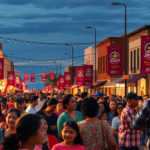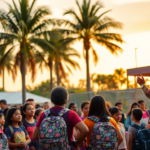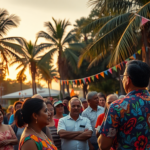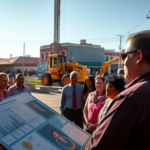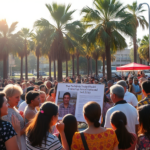Providing Meals for Residents Affected by Storm & Flooding: A Community Initiative
As residents of the Rio Grande Valley recover from the aftermath of severe storms and flooding, a crucial initiative aims to bring immediate relief by providing meals to affected families. This community effort, set to take place at 2 PM today, underscores the spirit of solidarity and resilience in South Texas, demonstrating a commitment to Valley residents facing hardships.
Mobilizing Support for the RGV
In response to the recent flooding, community leaders and local organizations have banded together to organize a meal distribution event. This action not only addresses the immediate nutritional needs of those impacted but also signals a broader effort to support recovery and rebuild the community.
Organized by a coalition of nonprofits, religious organizations, and local businesses, the event will be held at a designated central location accessible to residents from the hardest-hit areas. The initiative is part of a coordinated flood response in the region, an essential component considering the scale of the impact that saw parts of the Valley struggle under significant water levels.
Voices from the Community
Community leader and event coordinator Maria Gonzalez expressed the urgency and importance of the initiative. “These storms have left many families without basics like food and shelter,” she said. “We are here to ensure no one goes hungry and to provide a sense of hope and community support during these challenging times.”
The significance of such initiatives resonates deeply with the affected individuals. John Ramirez, a local resident displaced by the flooding, shared his gratitude. “Knowing that the community cares and is ready to help people like me means the world. It’s support like this that helps us keep going,” he stated.
Connecting with Past Events
Flooding is not an unfamiliar challenge to the Rio Grande Valley, a region that has historically faced extreme weather conditions. Previous events have prompted the community to improve resilience strategies, focusing on preparedness and prompt response.
Similar relief efforts have been organized in the past, each time learning and adapting to better meet the needs of Valley residents. These continuous efforts highlight the community’s keenness on evolving and enhancing local preparedness to mitigate future impacts.
Broader Impact: Ensuring Community Interest
The meal distribution event is more than a response to immediate needs; it reflects a broader commitment to community interest. By addressing fundamental needs such as food security, the initiative helps stabilize affected families, allowing them to focus on long-term recovery and rebuilding.
Local officials have raised concerns about the ongoing impacts of such natural disasters on the local economy and infrastructure. Efforts like meal provision serve as an immediate relief measure, but leaders acknowledge the need for increased investments in infrastructure and comprehensive emergency plans to safeguard against future events.
Perspectives and Challenges
While the ground-level response has been commendable, there remain wider discussions concerning resource allocation and disaster preparedness at the state level. As Hidalgo County Commissioner Robert Solis mentioned, “We need sustained support from state and federal levels to build resilient infrastructure. Our communities show immense strength, but they require broader policy support.”
On the ground, volunteers and organizers echo a similar sentiment, stressing the importance of coordinated efforts and timely response to minimize suffering. Balancing immediate relief with long-term recovery strategies poses a challenge that requires ongoing dialogue and cooperation among stakeholders.
Future Implications and Resources
Looking ahead, the success of the meal distribution event may motivate additional community-based initiatives, reinforcing the importance of grassroot actions during crises. Moreover, it underscores the necessity for ongoing educational campaigns and training programs to prepare residents for future emergencies.
For those affected by the recent floods, various local resources and contacts are available, including a dedicated hotline and informational web portals set up to guide and assist residents. These resources offer critical information on recovery steps including FEMA aid, housing support, and emotional counseling.
In conclusion, today’s meal distribution effort is a testament to the robust community spirit and dedication of the Rio Grande Valley. It is a reminder that in times of crisis, coming together and supporting one another is not just essential; it is an embodiment of the values that hold this community together and drive it towards recovery and growth.


